Global Emerging Technology Summit Recap
Summary of the highlights from SCSP's Global Emerging Technology Summit on September 21, 2023.
Hello, I’m Ylli Bajraktari, President and CEO of the Special Competitive Studies Project (SCSP). In this edition of the 2-2-2, Associate Director Channing Lee and Senior Director Joe Wang of SCSP’s Foreign Policy Panel share highlights from our Global Emerging Technology Summit that brought together leading innovators, entrepreneurs, and policymakers to discuss the future of geopolitics, democracy, technology, and warfare.
Last week, SCSP hosted the third Global Emerging Technology Summit. The agenda included 68 government, tech industry, and other private sector and non-governmental leaders – including 48 from the United States and 20 from foreign partners – in 30 sessions throughout the day.
SCSP made two important announcements. From May 7-8, 2024, SCSP will host an AI Expo for National Competitiveness, the first of its kind in Washington, D.C., in coordination with the second Ash Carter Exchange on Innovation and National Security. In addition, SCSP will launch a Commission on the Scaling of Fusion Energy. We are excited to share more details on these efforts in the coming weeks and months. Stay tuned!
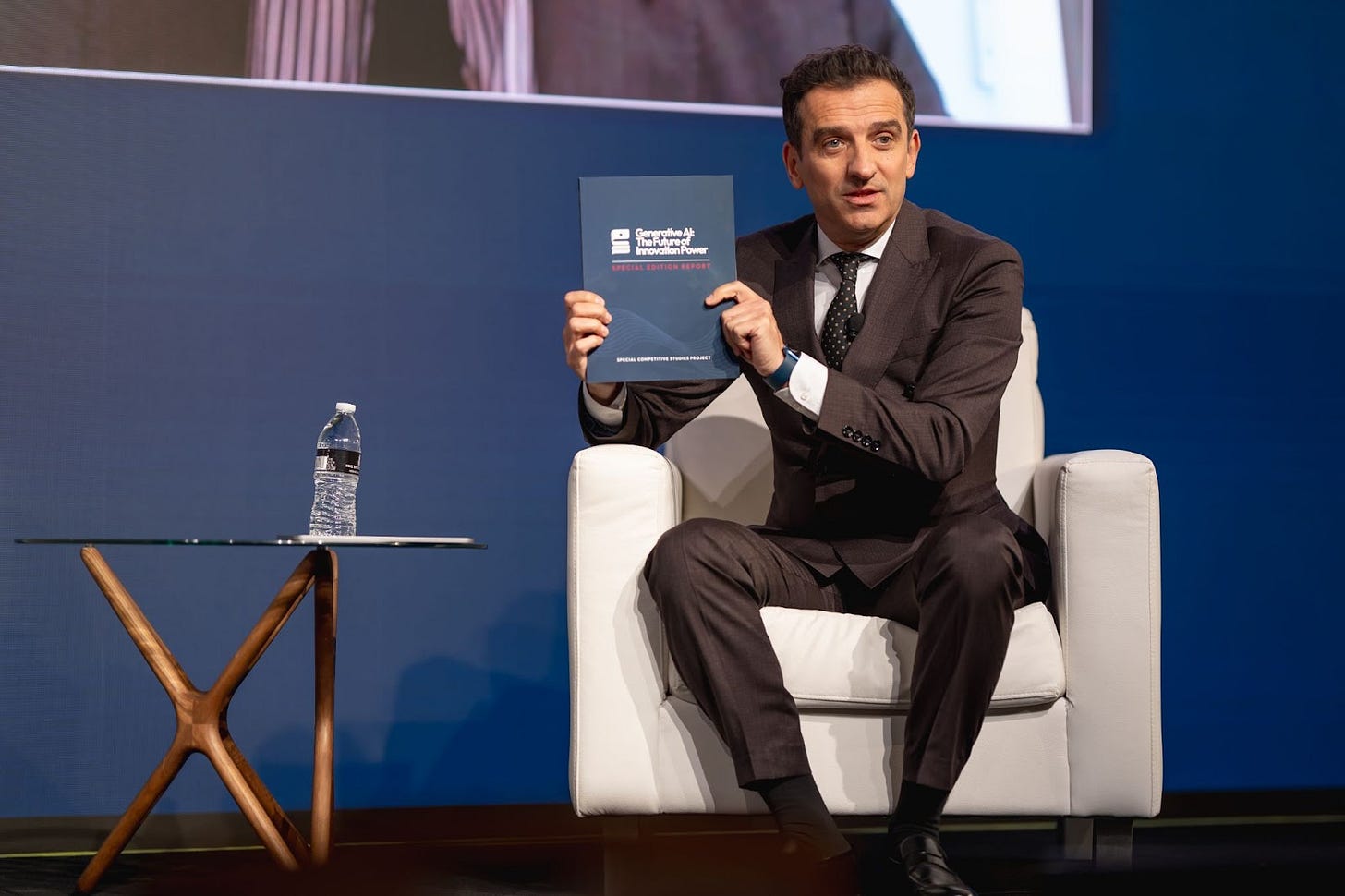
The 12 months since the 2022 Summit have witnessed a whirlwind of advances in generative AI, as well as new AI-focused legislation and policy initiatives from Congress and the White House. And as Russia continues its brutal war against Ukraine, the strategic use of technology on the battlefield and the possible implications for PRC aggression against Taiwan have been front and center geopolitically. Amidst these developments, SCSP released a special report on “Generative AI: the Future of Innovation Power” earlier this month to respond to the impending challenges and opportunities the United States and our allies and partners will face.
As SCSP Chair Dr. Eric Schmidt stated in his remarks, “innovation will be more powerful than hard power or soft power.” Throughout the entire day, speakers created an atmosphere at this year’s Summit that reflected the urgency to solve the problems facing the United States and our allies and partners today by capitalizing on our innovation power.
We are grateful to the many of you that joined us for our historic Summit. As always, we value your feedback and thoughts, so please share them with us!
Below are our takeaways from the 2023 Global Emerging Technology Summit:
1. From the Executive Branch to Congress, and through the state levels, the United States government is organizing around technology competition and focused on ensuring U.S. leadership for this next era of innovation.
In recorded remarks, Secretary of State Antony Blinken outlined the five interconnected lines of effort the State Department is pursuing in the realm of tech diplomacy: (1) advancing our vision for the technological future, (2) shaping the rules of the road, (3) promoting trusted digital infrastructure, (4) rewiring tech ecosystems, including supply chains, and (5) applying a “small yard, high fence” approach to sensitive technologies. The Secretary also stressed the importance of the United States government working with non-governmental partners to advance our nation’s tech leadership.
During a fireside chat with former acting Director of the Central Intelligence Agency Michael Morell, Director of National Intelligence Avril Haines asserted that “[w]e need to use emerging technologies for mission,” from building standards for interoperability across the intelligence community, to encouraging private-public collaboration, to promoting innovation through proper funding.
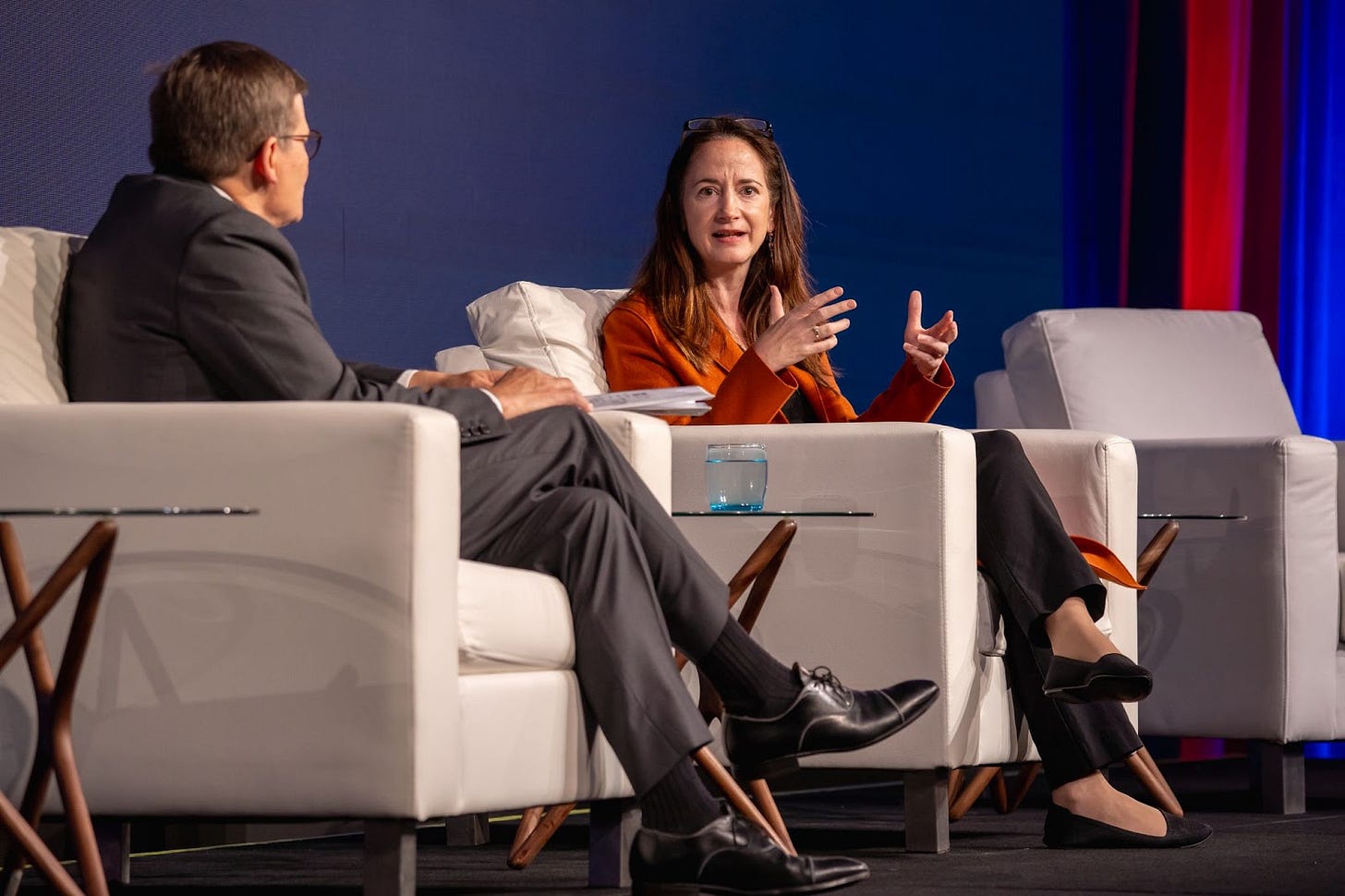
Congressional leaders conveyed similar urgency.
Senate Majority Leader Chuck Schumer (D-NY), having just convened Capitol Hill’s first AI Insight Forum the week prior, said in his keynote that he is committed to working with colleagues on both sides of the aisle to draft AI legislation that works for all Americans, warning that extremists and disarray within Congress sends a “terrible message” to the world, especially the PRC.
Senator Mike Rounds (R-SD) affirmed in his keynote that we need energy and optimism in AI and technologies writ large, especially in the rising generations, because our power is our people. He emphasized that our nation's efforts to advance AI cannot end with Congress.
Senator Martin Heinrich (D-NM) said in recorded remarks that legislative efforts in Congress are “shaping the inputs that will deliver us the AI future that we want.”
Senator Todd Young (R-IN), highlighting that America will soon celebrate its 250th birthday in 2026, stressed in his keynote that “now is the time for Congress to step in” to develop legislative solutions for the threats that AI poses, “while striking a balance with innovation.”
Representative Mike Gallagher (R-WI), in his role as the Chairman of the House Select Committee on the Chinese Communist Party (CCP), said in recorded remarks that the CCP fears “AI that they cannot control,” which is why it is so “essential that emerging technologies are wielded in defense of freedom and flourishing around the globe.”
During the panel on “The Future of U.S. Regional Innovation,” Governors Kristi Noem of South Dakota (R) and Eric Holcomb of Indiana (R) discussed with SCSP Senior Advisor PJ Maykish the great investments U.S. states are making to spur innovation domestically.
Governor Holcomb said competition between states isn’t necessarily a bad thing, observing that CHIPS Act funding going to Purdue University led his team to think regionally about innovation.
Governor Noem advised that those crafting federal policies on innovation should seek input from state governors because “Governors are more nimble than national policymakers. Governors are living in their communities. Governors are CEOs.”
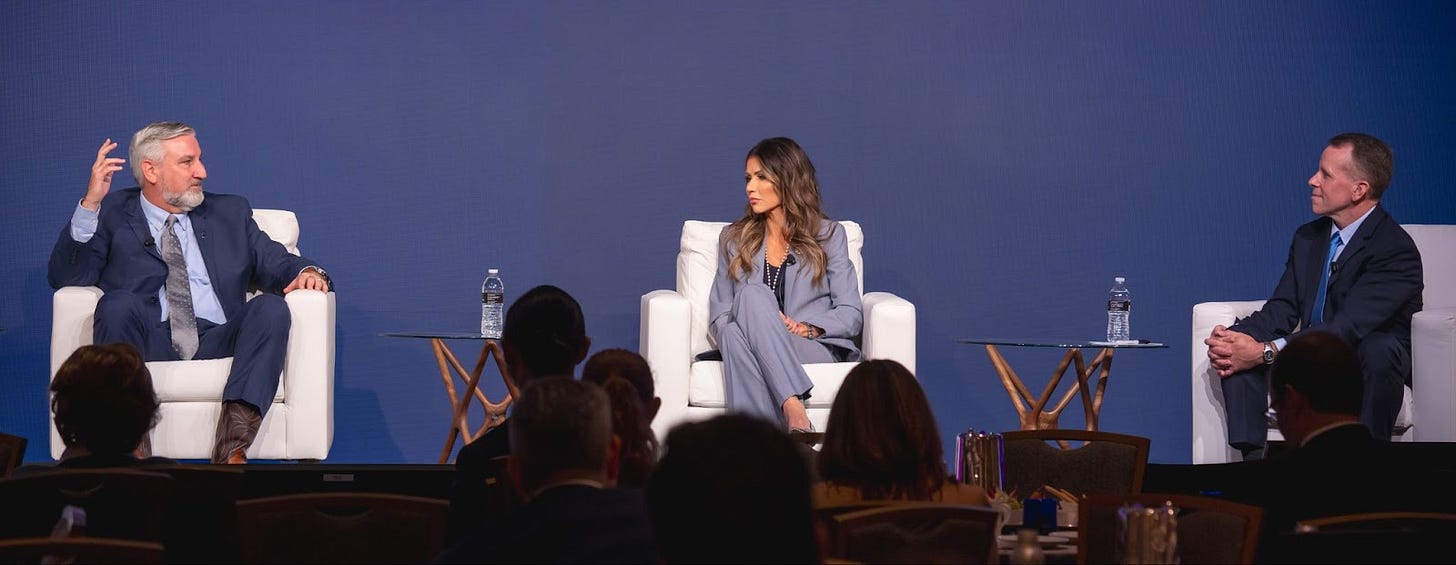
2. We - democracies - must first win in Ukraine.
Ukraine’s Minister of Strategic Industries Oleksandr Kamyshin delivered the first keynote of the morning, echoing his president's simultaneous gratitude and plea for further assistance.
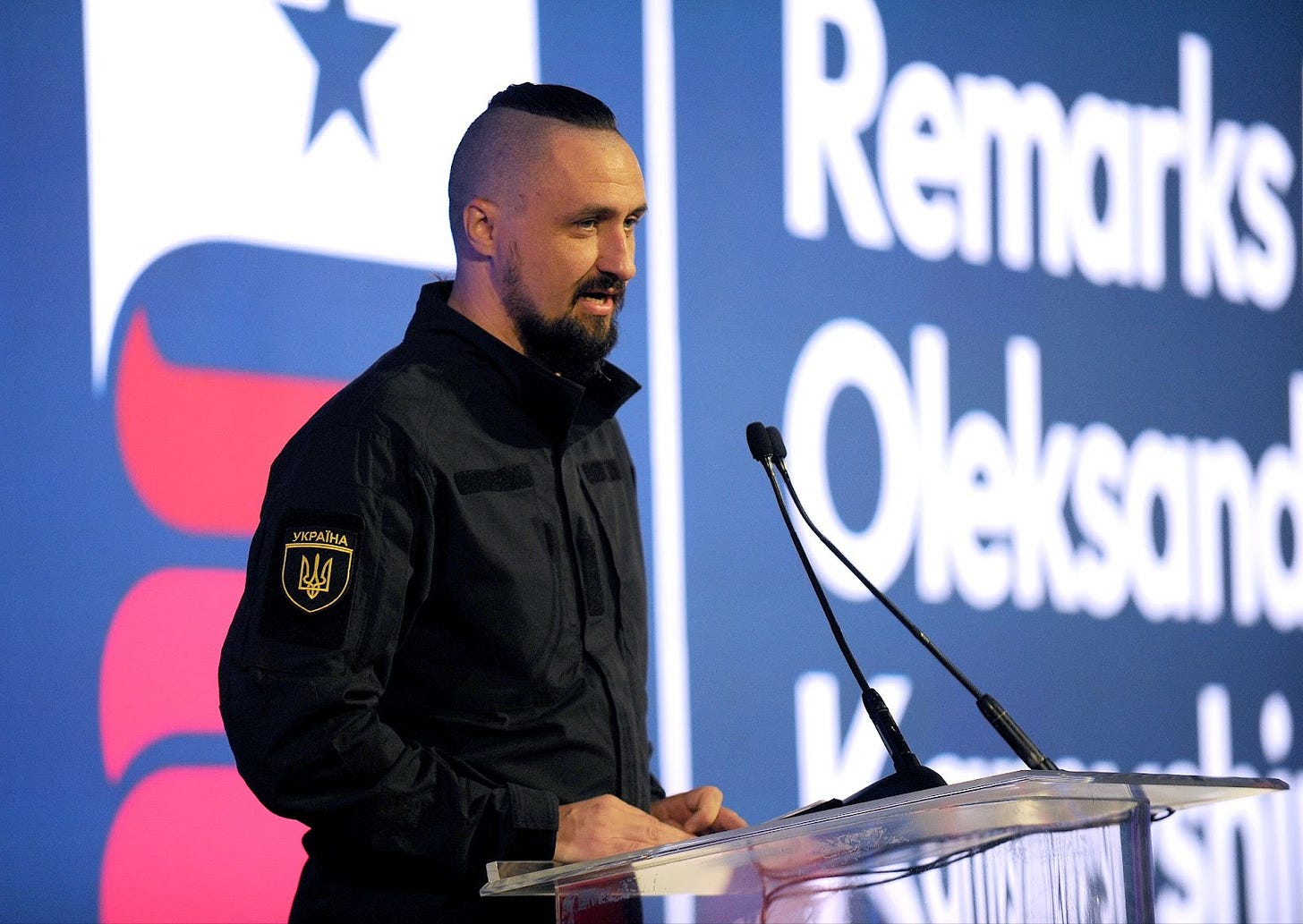
In the panel “Ukraine and the Future of Warfare,” moderated by Major General (ret.) Mick Ryan, Non-Resident Fellow at the Lowy Institute and Adjunct Fellow (Non-resident) and Australia Chair at the Center for Strategic and International Studies:
Andrey Liscovich, Founder of the Ukraine Defense Fund, shared that there are no silver bullets – Ukraine must constantly adapt in a decentralized way, but the injection of new people into the Ukrainian military has spurred innovation and military applications of civilian technologies have helped Ukraine leverage new elements of power to push back against a numerically superior foe.
Representative Rob Wittman (R-VA), Vice-Chair of the House Armed Services Committee, spoke about the need to update existing weapons systems to optimize for range and lethality, which he explained we have so far sacrificed for precision. “We need a more consistent demand signal for industry,” he said.
Representative Raja Krishnamoorthi (D-IL), Ranking Member of the House Select Committee on the CCP and a member of the House Permanent Select Committee on Intelligence, cautioned that deterrence did not work in Ukraine. “If we don't stand up a credible deterrent in Taiwan,” he said, “then Xi is more likely to move for militarized reunification.”
In the panel on “The Future of Geopolitics,” moderated by SCSP President and CEO Ylli Bajraktari:
Senior Fellow at the Hoover Institution and former U.S. National Security Advisor Lt Gen (ret.) H.R. McMaster asserted that “Ukraine is fighting for all of us in the free world,” warning that “weakness is provocative.”
Lord Mark Sedwill, former National Security Advisor of the United Kingdom, agreed, adding that “strength and patience is a deterrent,” although defending Taiwan will be “10 times as hard” as defending Ukraine.
Former French Chief Diplomatic Advisor to President Philippe Étienne said the lesson from the 1930s is that “democracies must be strong and not compromise on basic principles.” It might be difficult, he said, but “we are not alone in the world.”
Comparing the Israeli approach, Senior International Fellow at the Foundation for Defense of Democracies and former National Security Advisor of Israel Dr. Eyal Hulata said countries need to increase defense budgets, but “the type of war we must prepare for is different today.” Nevertheless, he noted that Russia’s war in Ukraine shows that “hard military force is still relevant.”
In a fireside chat on “Fighting Autocracy in Russia,” moderated by Joan O’Hara, Senior Vice President of Public Policy at the XR Association and former acting National Security Advisor to the Vice President:
Maria Pevchikh, Chairwoman of the Anti-Corruption Foundation, shared about the work of her foundation and its volunteers to reach out to the Russian people to encourage them to question the Kremlin’s propaganda.
Dasha Navalnaya, daughter of jailed Russian opposition leader Alexey Navalny, pointed to a future for Russia where the Russian people are free from Putin’s tyranny.
3. The United States needs to build a shared positive vision of technology and our societies with our allies and partners – some are even a few steps ahead, and we should learn from our friends.
This year’s summit featured four, dynamic Asian nations at the forefront of technology.
Japan’s Minister for Digital Transformation KONO Taro discussed Japan’s efforts to integrate AI and cyber capabilities into government infrastructure. In a virtual discussion with Financial Times’ U.S.-China Correspondent Demetri Sevastopulo, Minister Kono called for the United States to appoint a Secretary for Digital Affairs and expressed enthusiasm for further collaboration between the United States and Japan on tech standards and regulation. Senator Bill Hagerty (R-TN), who previously served as U.S. Ambassador to Japan, said in a subsequent fireside chat that U.S.-Japan security cooperation has changed dramatically, especially during the term of the late Prime Minister Shinzo Abe. Noting President Biden’s recent trilateral with Japanese Prime Minister Kishida and Republic of Korea President Yoon at Camp David, Senator Hagerty encouraged further collaboration with Japan on defense, research and development, and economic issues.
The Republic of Korea’s Minister of Science and Information and Communication Technologies (ICT) Lee Jong-ho, in recorded remarks, lauded recent developments in U.S.-ROK relations and shared that Korea is focused on developing emerging technologies – especially quantum – and governance strategies to regulate their use.
Singapore’s Minister for Foreign Affairs Vivian Balakrishnan participated in a virtual fireside chat with SCSP NatSecTech Podcast Host Jeanne Meserve, and stressed that governments need to more urgently consider how autonomous AI with transactional capabilities will impact political governance, defense, and security.
Taiwan’s Minister of Digital Affairs Audrey Tang joined SCSP Senior Director for Foreign Policy Joe Wang for a fireside chat to discuss Taiwan's digitization efforts. Tang explained that “whenever there's an attack on our democracy, we just counter with more democracy” – the solution is to “increase the bandwidth” and “reduce the latency” of democracy. When asked to share advice for the next generations, she encouraged young people to “rethink democracy as a social technology.”
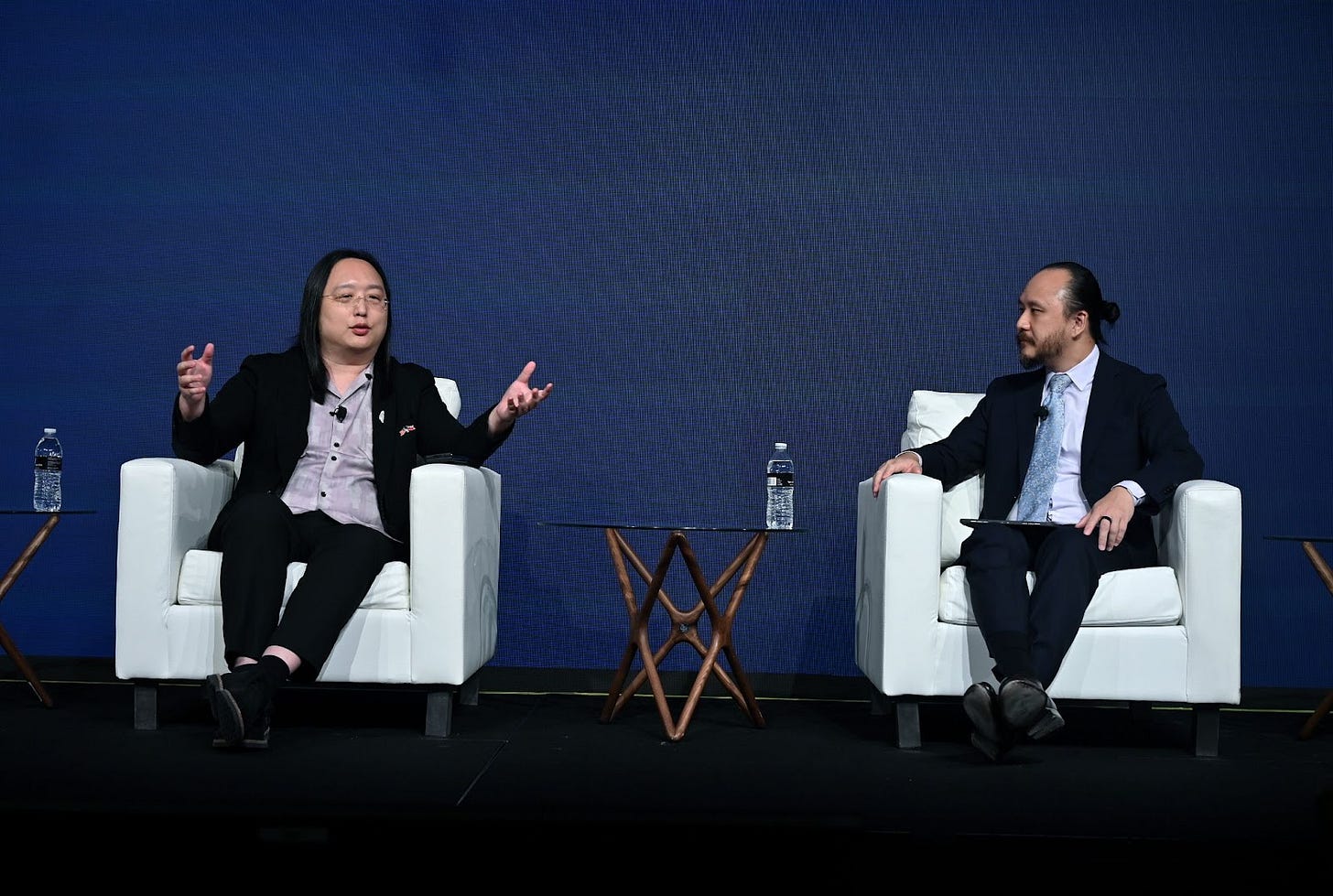
In a discussion on “The Future of AI in the Middle East,” moderated by Nadia Schadlow, Senior Fellow at the Hudson Institute and former U.S. Deputy National Security Advisor for Strategy:
His Excellency Omar Sultan Al Olama, the United Arab Emirates’ Minister of State for Artificial Intelligence, said AI governance challenges are different based on geography, meriting the need for agile governance discussions with realistic, pragmatic private sector involvement. The UAE can be a testing ground, he said, because the country’s diverse population allows it to be a partner for local and global firms alike.
Israel Innovation Authority CEO Dror Bin explained that Israel ranks very high in AI adoption due to public-private partnership models such as the sandbox model, which brings participants together to experiment and test regulation.
Ambassador Daniel Shapiro, Senior Advisor for Regional Integration in the Bureau of Near-East Affairs at the U.S. State Department and the former U.S. Ambassador to Israel, commended the deepening of Israel-UAE relations and noted that it can help identify solutions to regional challenges like the clean energy transition and water security.
From the United Kingdom:
Deputy Prime Minister Rt Hon Oliver Dowden CBE MP joined SCSP President and CEO Ylli Bajraktari for a fireside chat to promote the upcoming UK AI Safety Summit, which he hopes will plant the seeds of an institutional framework for AI governance.
In a panel on “Transatlantic Cooperation on Strategic Competition,” moderated by Jamil Anderlini, Editor-in-Chief of Politico Europe:
Member of the European Parliament Eva Maydell (Bulgaria) said “Transatlantic cooperation is thriving,” and technology presents further opportunities to deepen such collaboration.
U.S. Representative Brendan Boyle (D-PA) agreed that the relationship has reached a new high since 2003, though disagreements about digital trade and data privacy continue to present challenges.
Anticipating more bipartisan support for Ukraine in Congress, U.S. Senator Michael Bennet (D-CO) said the war has reinvigorated the transatlantic alliance structure by evoking a culture of cooperation to fight for democracy.
Member of the European Parliament Dragoș Tudorache (Romania) said the United States and Europe are gradually “aligning on China” and that he has “great hope” about alignment on AI issues.
4. American technology companies now recognize the national and global roles they play and are looking to align with U.S. government priorities to work toward a future where technology reinforces our values.
This year’s Summit featured titans of the American tech industry, who illuminated how they see technology changing the world as we know it, and how industry and government can work together to build a positive vision for technology and democracy.
NVIDIA President and CEO Jensen Huang, in a virtual fireside chat with SCSP Senior Director for Platforms David Lin, discussed his vision for where the AI revolution is headed. Mr. Huang discussed how his company discovered over two decades that AI is not just a widget, but rather a new way of doing software. This means that “AI is a systems problem – not a chip problem.” He also emphasized the importance of hiring university talent, saying, “We need to be really mindful and thoughtful about immigration so we can train the world’s talent and keep them here. They need to feel welcome to stay.” With a personal touch, he added that, “a long time ago, I had the benefit of coming to this country….In my case, this was a dream come true.”
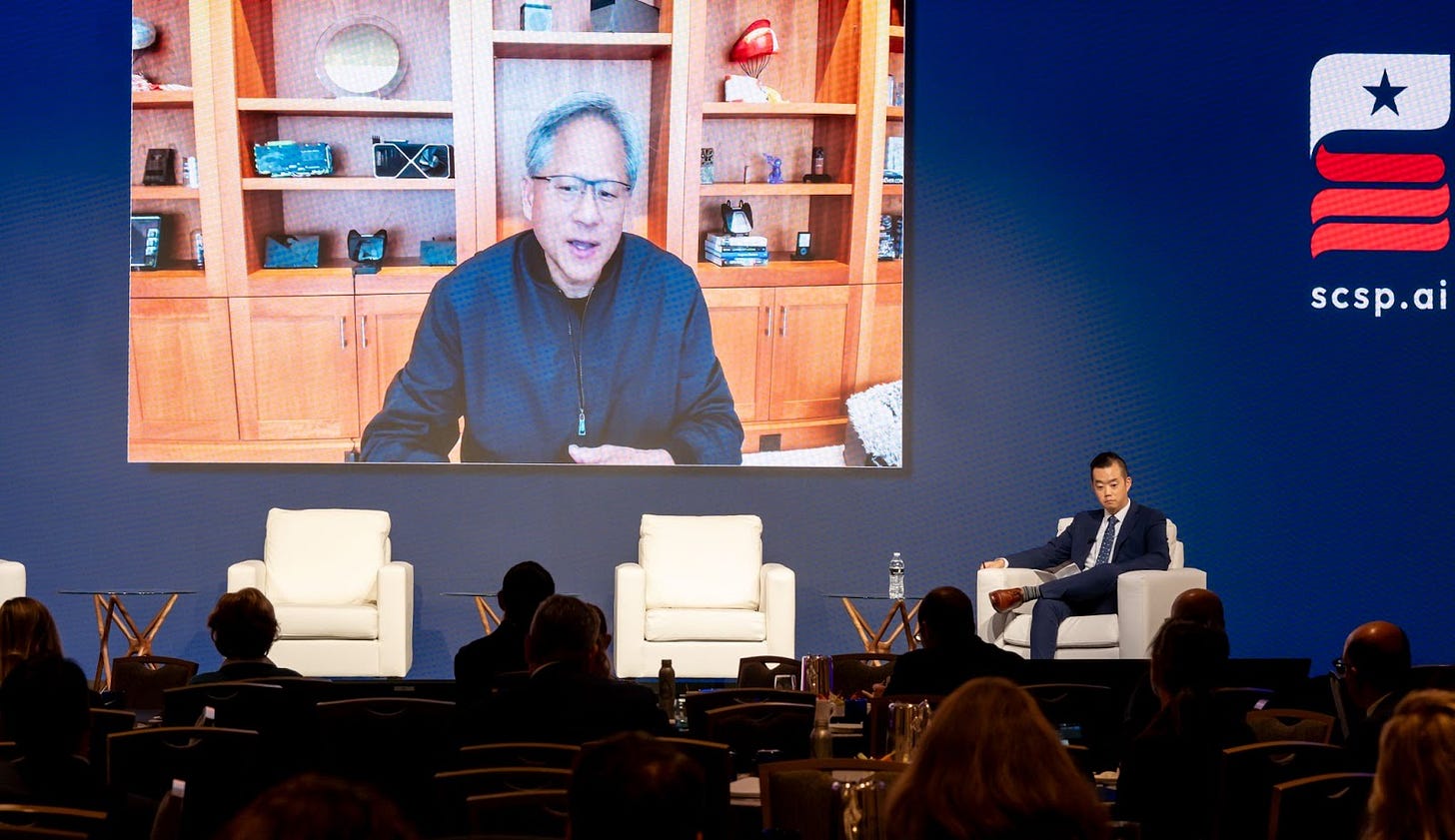
Snap Inc. co-founder and CEO Evan Spiegel, in a fireside chat with Senior Media Reporter Sara Fischer of Axios, highlighted his company’s advancements in augmented reality, saying the technology is “changing the way people interact with computing.”
Intel CEO Pat Gelsinger, during a fireside chat with Chris Darby, Global Head of Venture Investments and Senior Managing Director of Cerberus Capital Management, said “Industrial policy is not a dirty word, it’s a national priority.” He urged the U.S. government to help “put its thumb on the scale” and advocated for a CHIPS Act 2.0 two years from now.
Anna Makanju, Vice President of Global Affairs at OpenAI, in a fireside chat with SCSP Senior Director for Society Rama Elluru, shared that the Frontier Model Forum, a new initiative launched together with other American AI companies, aims to build a bridge for the best insight from industry to assist in determining how AI models should be regulated.
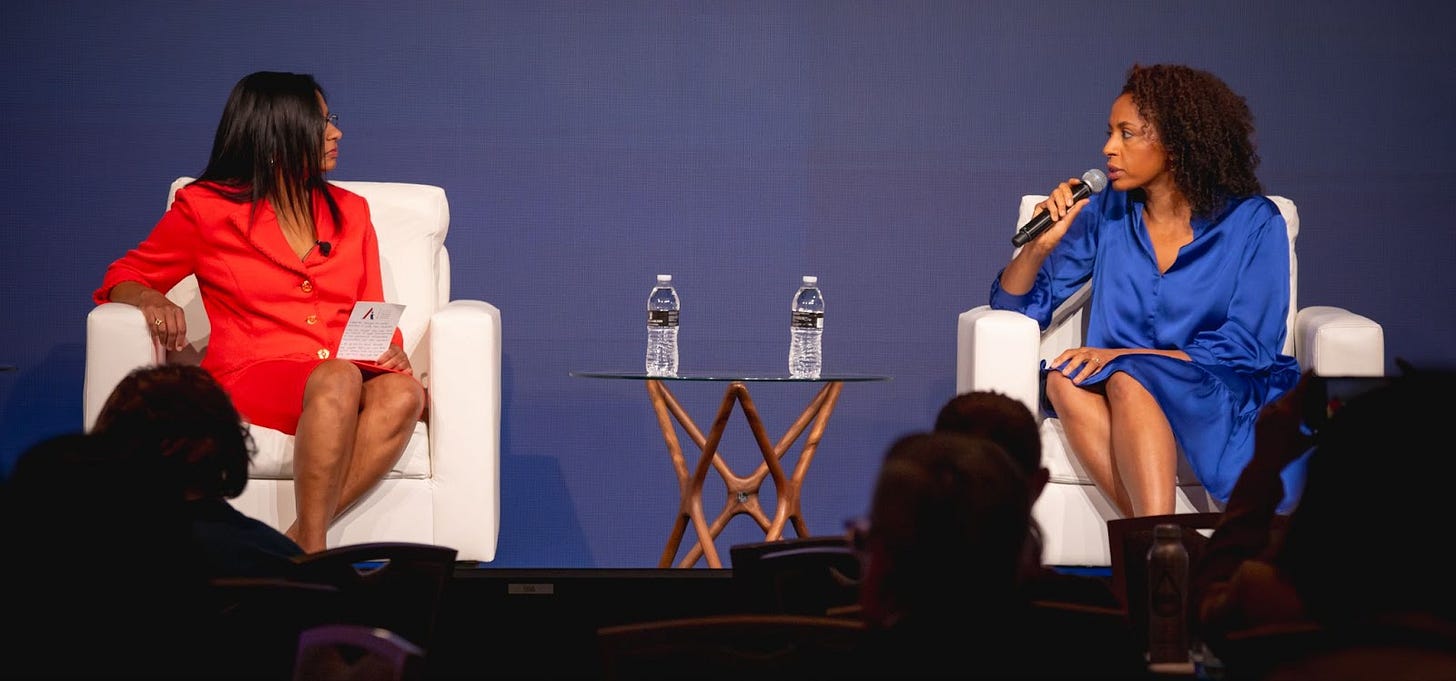
In a panel on “The Future of AI” moderated by Axios’s Global Technology Correspondent Ryan Heath:
Reid Hoffman, a partner at Greylock and co-founder of LinkedIn and Inflection AI, pointed to the imminent arrival of “amplification intelligence,” which will transform information generation, synthesis, and analysis and “give you superpowers in everything that you do.”
Dr. Tom Mitchell, Founders University Professor at Carnegie Mellon University and Co-Chair of SCSP’s Generative AI Task Force, provided three principles for AI regulation: (1) the most important AI regulation must occur at the application level; (2) generic foundation models will be tough to regulate but can be approached like food nutrition labeling; and (3) the world is moving very fast; we’ll need a third party, analogous to the body used to detect and report computer viruses, to adapt quickly.
Groq Founder and CEO Jonathan Ross delivered an incredible technology demonstration showcasing the power of what American-made hardware – “the fastest AI chip that has ever been built” – can help large language models achieve.
Mounir Ibrahim, Executive Vice President of Truepic, and Santiago Lyon, Head of Advocacy and Education for the Content Authenticity Initiative (CAI) at Adobe, presented the case for content provenance in AI systems and how the Coalition for Content Provenance and Authentication (C2PA) can help build standards that increase transparency and authenticity of information online.
5. Technology and innovation can unlock the solutions for the future of democracy.
In a panel on “The Future of Democracy Assistance,” moderated by former Deputy Administrator and COO of the United States Agency for International Development Bonnie Glick.
Shanthi Kalathil, Board Member of the National Democratic Institute (NDI), said the future of democracy assistance depends on technology and that NDI continues to support the open internet to ensure that tech is used to further democratic values.
Daniel Twining, President of the International Republican Institute (IRI), said IRI thinks about four big sets of issues: (1) supporting internet freedom, (2) information integrity, (3) countering foreign/malign influence, and (4) building digitally native democracies.
Damon Wilson, President and CEO of the National Endowment for Democracy (NED), said democratic societies are the ones that embrace innovation, entrepreneurship, and alliances and that democracies must continue to hold to these ideals if we are to continue to lead.
All three leaders agreed that democracies must deliver – as Shanthi said, “We have to foster the kind of innovation that we want to see.”
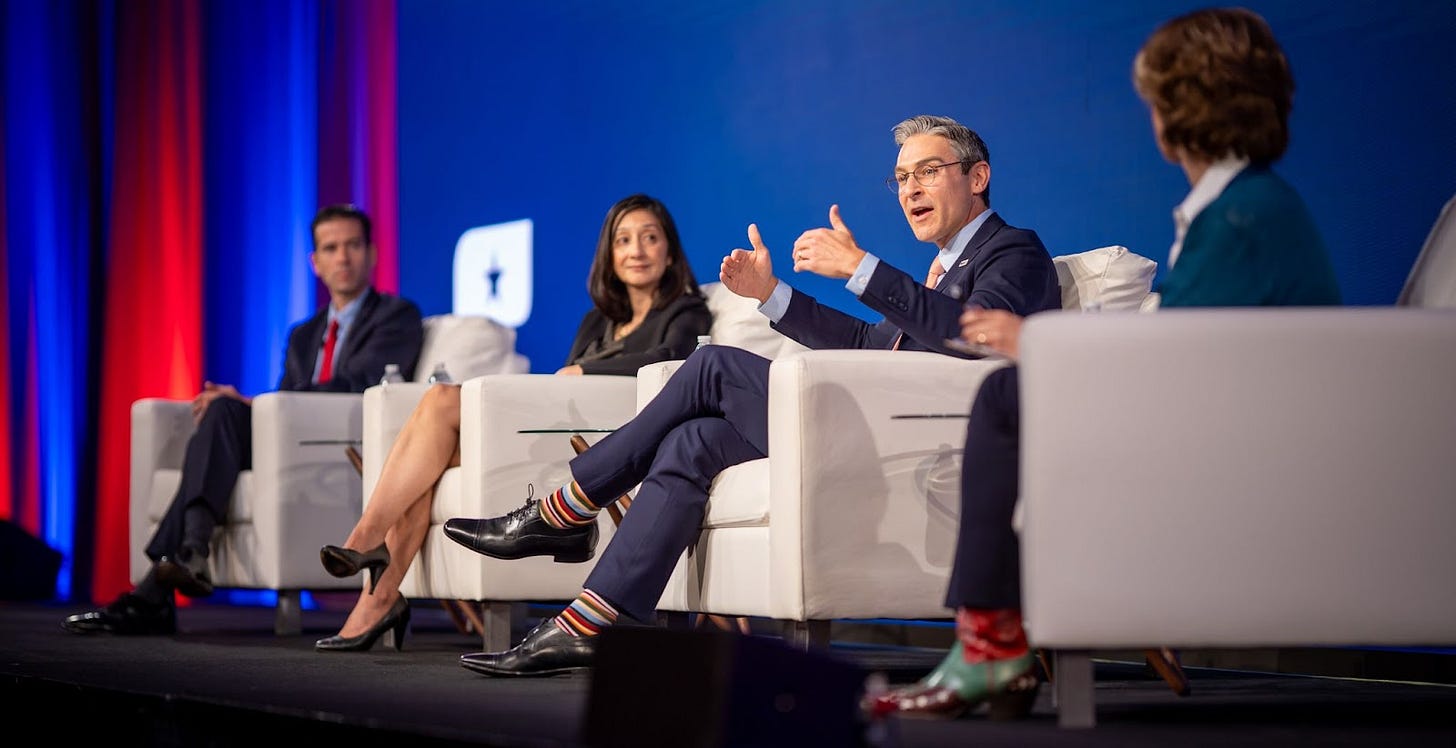
During a panel on “The Future of Democracy” moderated by SCSP Senior Advisor Ylber Bajraktari:
Michael Chertoff, co-founder and executive chairman of the Chertoff Group and former U.S. Secretary of Homeland Security, said he was concerned about the lack of trust in government and institutions, as well as facts and science.
Dr. Condoleezza Rice, Director of the Hoover Institution and former U.S. Secretary of State, agreed that trust is declining, but stressed that Americans are still voting in record numbers – “democracy is layered.”
Sir Alex Younger, former Chief of the United Kingdom’s MI6, said democracy is the “best way of organizing yourself both in terms of its moral legitimacy but also its resilience.” He underscored that, despite efforts by foreign adversaries to interfere in democracy, “democracies have agency” in solving any problems they might face.
Michael Froman, President of the Council on Foreign Relations and former U.S. Trade Representative, expressed optimism about democracy, describing it sarcastically as the “prettiest house on an ugly block.”
In a panel discussion on “The Future of Technology and Civil Society,” moderated by Jonas Parello-Plesner, Executive Director of the Alliance of Democracies Foundation:
Uranik Begu, Director for Western Balkans at the Plug and Play Tech Center, said “Technology will be the core of Kosovo’s economic development.”
Leopoldo López, a freedom activist from Venezuela and co-founder of the World Liberty Congress, concurred with Begu, stating that technology provides independence for individuals. However, he stressed that “technology is not neutral” and “requires a value orientation.” It is here that democracies must rise to the challenge.
All three agreed that, while the actions and decisions of government leaders are important to ensure the development of technology aligns with democratic values, civil society also has a critical role to play in supporting the implementation of these values in practice at home and abroad.
We are living in a time of significant geopolitical change. Emerging technologies have the potential to transform the way we live, work, and communicate, and it is important to be aware of the geopolitical implications of these technologies. SCSP was fortunate to convene distinguished speakers from many sectors across the world to move the discussion forward on how emerging technologies help advance freedom, strengthen democracies, and protect the rules-based order.

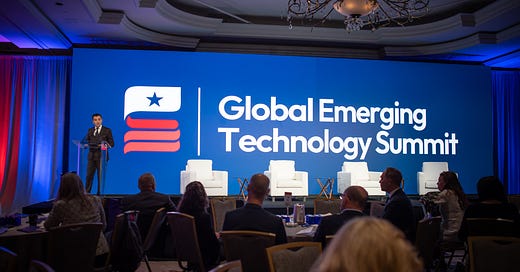





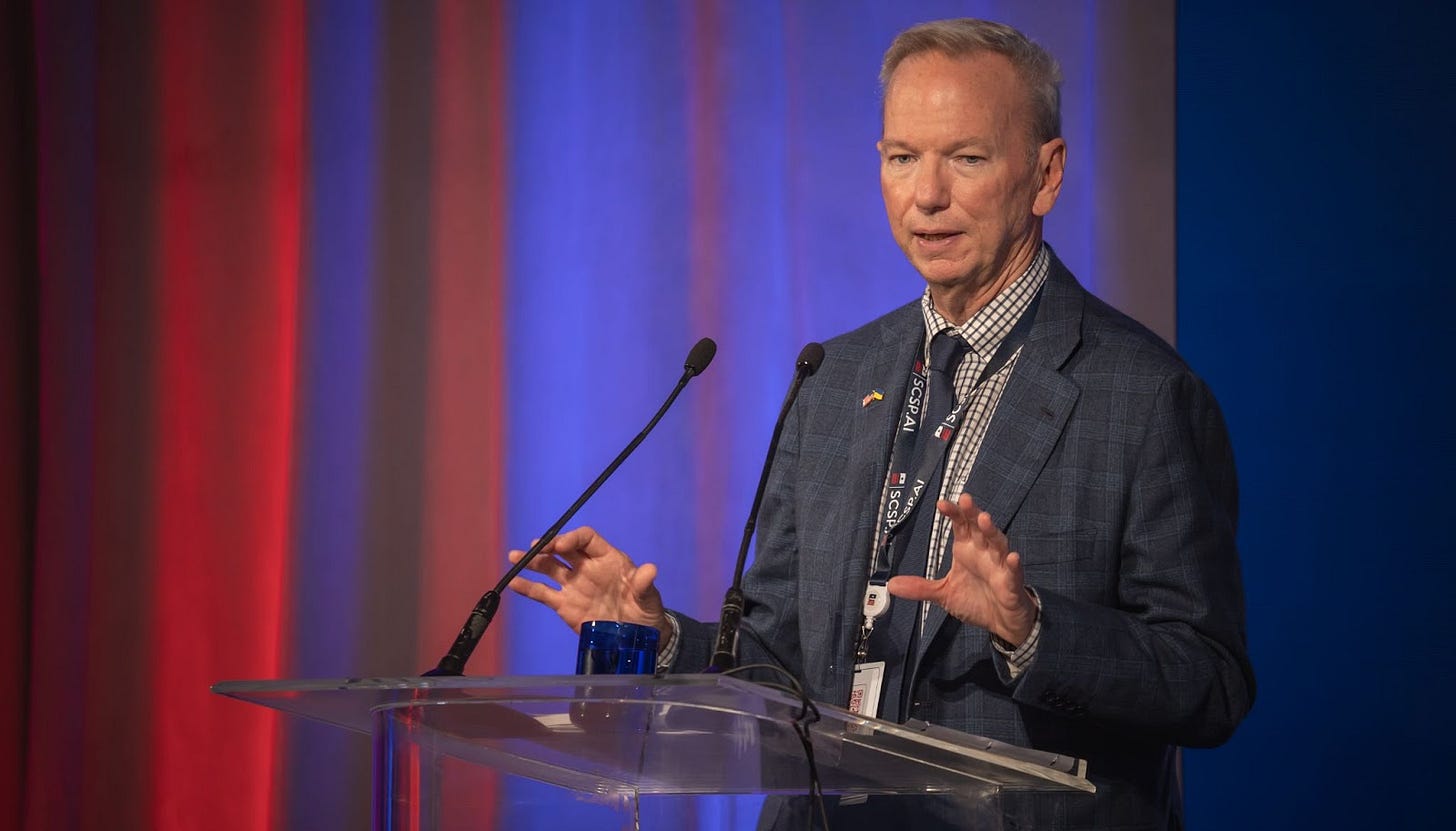
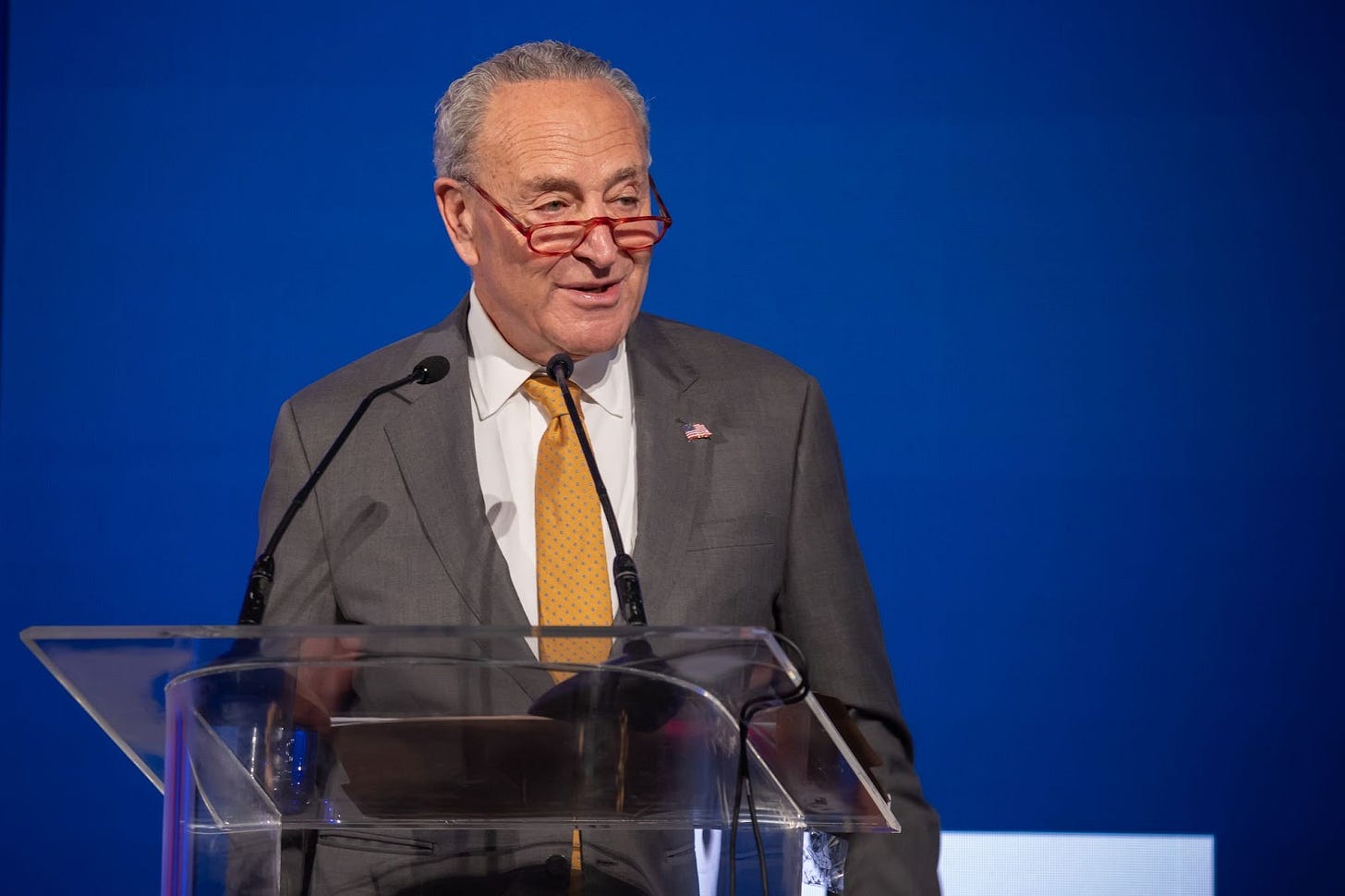
Are there any projects and/or committees created that one can join and participate in?
The diverse speakers opened the aperture for understanding the comprehensive impact of emerging technology across the geopolitical landscape. Resonating themes of ethics, autocracy vs. democracy, digital literacy, education, multidisciplinary and accountability were the silver threads calling for collaboration with global partners. There is no other organization like SCSP that is projecting solutions to complex problems and competitor advances for dominance.
Tom Creely, Ph.D.
Creator/Director Ethics & Emerging Military Technology Graduate Program
U.S. Naval War College